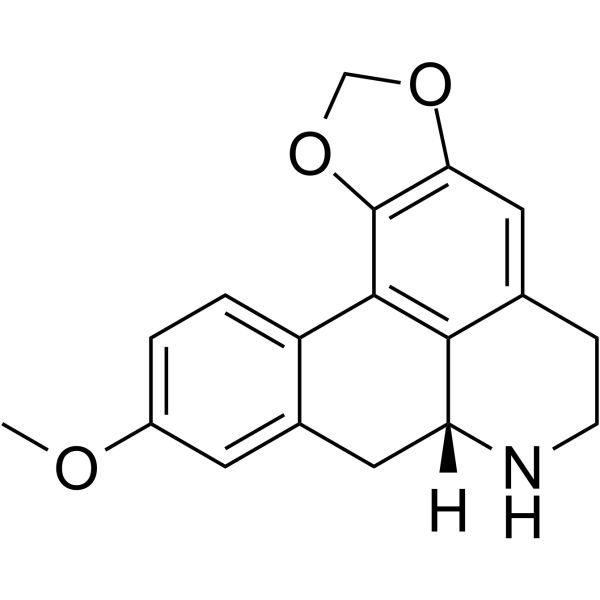Xylopine |
| Catalog No.GC64127 |
La xilopina es un alcaloide aporfina con actividad citotÓxica sobre las células cancerosas. La xilopina induce el estrés oxidativo, provoca la detenciÓn del ciclo celular G2/M y la apoptosis en las células cancerosas.
Products are for research use only. Not for human use. We do not sell to patients.

Cas No.: 517-71-5
Sample solution is provided at 25 µL, 10mM.
Xylopine is an aporphine alkaloid with cytotoxic activity on cancer cells. Xylopine induces oxidative stress, causes G2/M cell cycle arrest and apoptosis in cancer cells[1].
Xylopine (3.5 μM-14 μM; 24-48 hours) displays potent cytotoxicity in a time- and does-depenpent manner[1].Xylopine (72 h) has cytotoxic activity, with IC50 values ranging from 6.4 to 26.6 μM in eight different cancer cell lines (MCF7, HCT116, HepG2, SCC-9, HSC-3, HL-60, K-562, and B16-F10)[1].Xylopine (3.5 μM-14 μM; 24-48 hours) causes cell cycle block at the phase G2/M, which is followed by internucleosomal DNA fragmentation[1].Xylopine (3.5 μM-14 μM; 24-48 hours) significantly increases the early and late apoptosis, induces mitochondrial depolarization, and increases caspase-3 activation[1].Xylopine also causes an increase in the production of reactive oxygen/nitrogen species (ROS/RNS), including hydrogen peroxide and nitric oxide, but not superoxide anion, and reduces glutathione levels are decreased in Xylopine-treated HCT116 cells[1].HCT116 cells[1]3.5 μM, 7 μM, and 14 μM 24 hours, 48 hoursInduced G2/M phase arrest.HCT116 cells[1]3.5 μM, 7 μM, and 14 μM 24 hours, 48 hoursSignificantly increased the early and late apoptosis.
[1]. Luciano de Souza Santos, et al. Xylopine Induces Oxidative Stress and Causes G 2/M Phase Arrest, Triggering Caspase-Mediated Apoptosis by p53-Independent Pathway in HCT116 Cells. Oxid Med Cell Longev. 2017;2017:7126872.
Average Rating: 5 (Based on Reviews and 18 reference(s) in Google Scholar.)
GLPBIO products are for RESEARCH USE ONLY. Please make sure your review or question is research based.
Required fields are marked with *




















